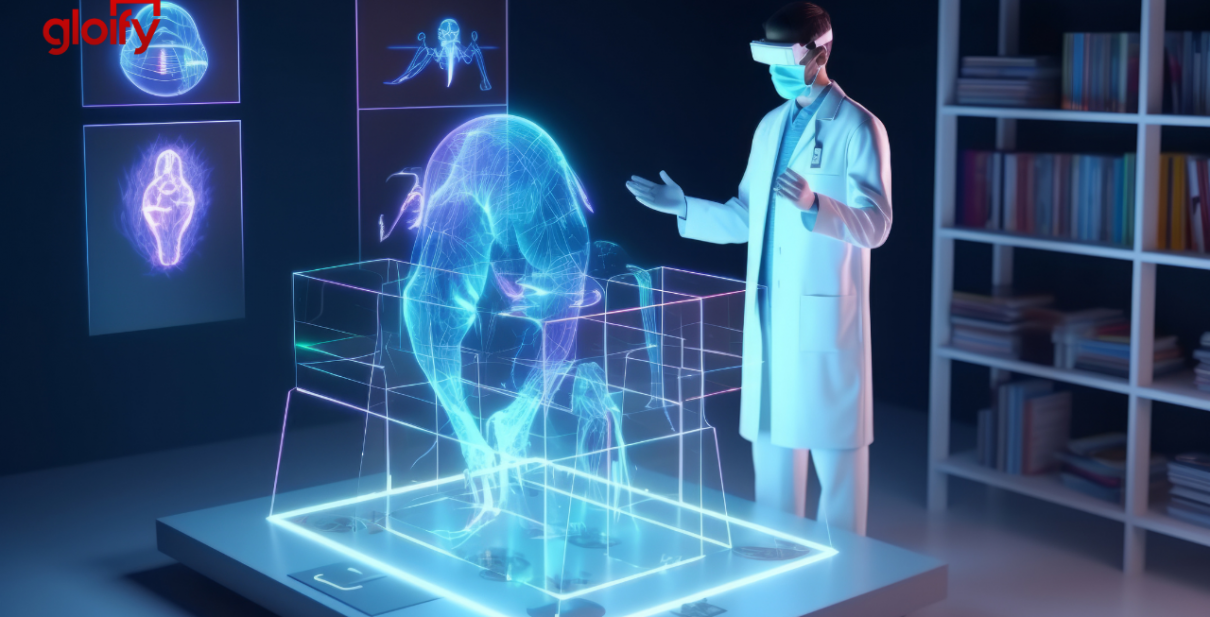The healthcare industry is undergoing a seismic shift, driven by the rapid advancements in artificial intelligence (AI) and machine learning technologies. At the forefront of this transformation is generative AI, a cutting-edge approach that has the potential to revolutionize the way we diagnose, treat, and manage various medical conditions. Generative AI in healthcare systems promises to streamline processes, enhance patient care, and unlock new frontiers in medical research and drug development.
Demystifying Generative AI into Healthcare:
Before delving into the benefits, it’s essential to understand what generative AI entails. Generative AI refers to a subset of AI models capable of generating new data, such as text, images, audio, or video, based on the training data they’ve been exposed to. These models learn the underlying patterns and relationships within the data, allowing them to create entirely new and unique outputs that mimic the characteristics of the training data.
In the context of healthcare, generative AI in healthcare systems can be applied in various domains, including medical imaging analysis, drug discovery, clinical decision support, and patient education. By harnessing the power of these models, healthcare professionals can gain valuable insights, streamline workflows, and ultimately improve patient outcomes.
Enhancing Medical Imaging Analysis:
One of the most promising applications of generative AI in healthcare is in the realm of medical imaging analysis. Traditionally, radiologists have relied on their expertise and experience to interpret medical images, such as X-rays, CT scans, and MRI scans. However, this process can be time-consuming and prone to human error, particularly when dealing with complex or rare cases.
Generative AI models can be trained on vast datasets of medical images and corresponding diagnoses, enabling them to identify patterns and anomalies with remarkable accuracy. These models can assist radiologists by generating detailed reports, highlighting areas of concern, and even suggesting potential diagnoses. By streamlining the analysis process, generative AI in healthcare systems can significantly reduce the workload on radiologists, allowing them to focus on more complex cases and provide more timely and accurate diagnoses.
Accelerating Drug Discovery and Development:
The process of drug discovery and development is notoriously time-consuming and expensive, often taking years and billions of dollars to bring a new drug to market. Generative AI in healthcare systems has the potential to revolutionize this process by accelerating the identification and design of new drug candidates.
Generative AI models can be trained on vast databases of existing drugs, their molecular structures, and their therapeutic effects. These models can then generate new molecular structures that exhibit desired properties, such as increased efficacy or reduced side effects. By leveraging the power of generative AI, pharmaceutical companies can significantly reduce the time and resources required for drug discovery, potentially leading to faster and more affordable drug development.
Enhancing Clinical Decision Support:
Clinical decision support systems (CDSS) are designed to assist healthcare professionals in making informed decisions about patient care. However, traditional CDSS often rely on predefined rules and static knowledge bases, which can become outdated or fail to account for unique patient characteristics or rare conditions.
Generative AI in healthcare systems can revolutionize CDSS by enabling them to generate personalized recommendations based on a patient’s unique medical history, current condition, and other relevant factors. These AI models can analyze vast amounts of data, including electronic health records, clinical guidelines, and medical literature, to provide tailored treatment plans and identify potential risks or contraindications.
By incorporating generative AI into CDSS, healthcare professionals can make more informed decisions, reduce the risk of errors, and ultimately improve patient outcomes.
Empowering Patient Education and Engagement:
Effective patient education and engagement are crucial for promoting better health outcomes and fostering a collaborative relationship between healthcare providers and patients. However, traditional methods of patient education, such as printed materials or generic videos, often fail to address the unique needs and preferences of individual patients.
Generative AI in healthcare systems can revolutionize patient education and engagement by creating personalized content tailored to each patient’s specific condition, health literacy level, and learning preferences. These AI models can generate customized educational materials, including text, audio, or video content, that explain complex medical concepts clearly and understandably.
Additionally, generative AI models can be integrated into conversational interfaces, such as chatbots or virtual assistants, to provide real-time support and answer patients’ questions in a human-like manner. By empowering patients with personalized and accessible information, generative AI can improve their understanding of their condition, promote adherence to treatment plans, and ultimately enhance their overall healthcare experience.
Ethical Considerations and Challenges:
While the potential benefits of generative AI in healthcare systems are undeniable, it is crucial to address the ethical considerations and challenges associated with this technology. Data privacy and security are paramount concerns, as healthcare data is highly sensitive and must be handled with utmost care to protect patient confidentiality.
Moreover, there is a risk of bias and discrimination in AI models if the training data is not representative or if the models perpetuate existing biases. Rigorous testing and validation processes must be implemented to ensure the fairness and accuracy of generative AI models in healthcare applications.
Additionally, the interpretability and transparency of these models should be prioritized to foster trust and accountability among healthcare professionals and patients alike. Regulatory frameworks and guidelines should be established to govern the development and deployment of generative AI in healthcare settings.
Conclusion:
The incorporation of generative AI into healthcare systems holds immense promise for transforming the way we approach medical diagnosis, treatment, and patient care. From enhancing medical imaging analysis and accelerating drug discovery to empowering clinical decision support and personalizing patient education, generative AI in healthcare systems has the potential to revolutionize the healthcare industry.
However, as with any transformative technology, it is crucial to address the ethical considerations and challenges associated with generative AI, ensuring data privacy, mitigating biases, and fostering transparency and trust. By embracing generative AI responsibly and ethically, we can unlock a future where healthcare is more personalized, efficient, and effective, ultimately leading to improved patient outcomes and a healthier society.

